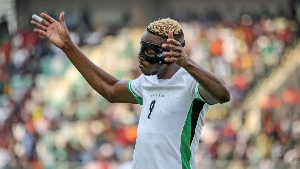Candidates for the office of the Chairman of the Economic and Financial Crimes Commission (EFCC) should subsequently be made from other law enforcement/security agencies, other than the police, as provided in the EFCC establishment Act of 2004.
This was one of the recommendations by the Justice Ayo Salami-led Judicial Commission of Inquiry into alleged abuse of office and mismanagement of federal government recovered assets and finances from May 2015 to May 2020, against the suspended Acting Chairman of the EFCC, Ibrahim Magu.
The allegations of sundry corruption and abuse of office were levelled against Magu by the Attorney-General of the Federation (AGF) and Minister of Justice, Abubakar Malami.
It would be recalled that the Panel was inaugurated by President Buhari in July and was given 45 days to carry out the assignment. The timeframe was later extended after the members requested for more time to enable for thoroughness.
The commission of inquiry specifically stressed that in appointing a new chairman, consideration should be given to candidates from other law enforcement or security agencies and qualified core staff of the EFCC, noting that the past four chairmen of the Commission, since inception, were from the police.
Presenting the report to President Buhari, the Chairman of the commission of inquiry, Justice Ayo Salami, recalled that since inception of the Commission, the four persons who had led it were drawn from the Police.
“Your Excellency, permit me to say that four successive chairmen of the EFCC from inception, have been drawn from the police, therefore, in appointing a new chairman of EFCC, consideration should be given to candidates from other law enforcement or security agencies and qualified core staff of EFCC as provided in the Economic and Financial Crimes Commission (Establishment Act 2004).
“It is also important to point out that at the moment, 970 policemen (114 drivers, 641 mobile policemen and 215 operations), are on secondment in the EFCC, therefore an exit plan for the disengagement of the police and other personnel within two years from now should be considered. This will address the issue of no promotion of core staff for over nine years.
“Your Excellency, our thinking here is that whoever you are appointing other than a core EFCC staff, should be in transitional capacity of two years during which period, arrangement would be made for appointment of any of the core staff who has been commended by National Crime Agency, UK and other international law enforcement for their professionalism,” he recommended.
Receiving the commission’s report at the State House in Abuja on Friday, President Muhmmadu Buhari, while commending and thanking members of the committee for their services, lamented the widespread of corruption in the country, so much that even government’s anti-corruption outfit had been mentioned in corruption allegation.
He said the involvement or mention of the very organisation saddled with leading the anti-corruption crusade is an abomination, which strikes at the heart of government’s fight against corruption and undermines all efforts to salvage the nation.
He, however, restated his commitment to stamping the menace of corruption out of Nigeria, saying he desires to make the nation a country that has no tolerance for corruption, but one where the menace is vigorously battled.
"Corruption is present in all countries. Some Governments treat it with levity. Some fight it all the time. I want Nigeria to be counted among those countries that do not tolerate but fight corruption.”
In order to protect Nigeria’s political and economic systems, and the continuous existence of the Nigerian State from the serious threat of corruption, the President called on all stakeholders, and indeed every Nigerian to own the fight against corruption at their respective levels.
Pledging that the fight against corruption is one that must be fought without fear or favour, President Buhari thanked members of the Commission for their dedication and commitment to the fight against corruption.
"The sad reality confronting us as a people is that there is corruption almost everywhere; at many levels of government, and nearly every stratum of our society. Mindful of the threat that corruption poses to us as a nation, this administration has specifically focused on the fight against corruption.
"As a government, and in furtherance of our anti-corruption programme, we have since inception engaged in many reforms in removing corruption including but not limited to the enforcement of Treasury Single Account (TSA), strict implementation of the Bank Verification Number Policy and signing unto the Open Government Partnership. A lot of efforts have gone into building and development of our anti-corruption institutions.
"We have so far kept faith with our promise and shall remain committed until Nigeria triumphs over the evil of corruption, attain a prosperous economic status and surmounts her security challenges.
"However, the stark reality of widespread corruption becomes poignant when allegations of corruption touches on the leadership of an institution set up by law to coordinate and enforce all economic and financial crimes. It is an abomination that strikes at the root, and undermines the Government’s anti-corruption programme.
"It was in response to the serious allegations against the Economic and Financial Crimes Commission that I set up a Panel headed by the Honourable Justice Isa Ayo Salami, retired President of the Court of Appeal, via an Instrument dated 3rd July 2020 pursuant to the Tribunals of Inquiry Act (Cap T21, LFN, 2004).
"We recognize that there are more grounds to cover in the war against corruption, and we are prepared to go out to possess those lands by cutting off any stream that nourishes the seed of corruption and supports its growth.
"Let it be known that in the fight against corruption, no one is too big to tackle, as no individual is bigger than the Nigerian State,” the President said.
General News of Friday, 20 November 2020
Source: thenationonlineng.net
Salami panel seeks to end police dominance over commission - EFCC
Entertainment












